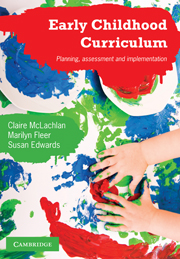Book contents
- Frontmatter
- Contents
- List of figures
- List of tables
- About the authors
- Acknowledgments
- Chapter 1 Introduction
- Chapter 2 Theory, research and the early childhood curriculum
- Chapter 3 Development and learning – how views of development shape how curriculum is framed
- Chapter 4 Curriculum as a cultural broker
- Chapter 5 Interpreting early childhood curriculum
- Chapter 6 Cultural-historical curriculum in action
- Chapter 7 Curriculum as a conceptual tool: Observation, content and programming
- Chapter 8 Assessing children and evaluating curriculum: Shifting lenses
- Chapter 9 Content knowledge: The sciences, maths and numeracy
- Chapter 10 Content knowledge: Language, literacy and ICT
- Chapter 11 Content knowledge: The arts and health, wellbeing and physical activity
- Chapter 12 Conclusions
- Index
Chapter 10 - Content knowledge: Language, literacy and ICT
- Frontmatter
- Contents
- List of figures
- List of tables
- About the authors
- Acknowledgments
- Chapter 1 Introduction
- Chapter 2 Theory, research and the early childhood curriculum
- Chapter 3 Development and learning – how views of development shape how curriculum is framed
- Chapter 4 Curriculum as a cultural broker
- Chapter 5 Interpreting early childhood curriculum
- Chapter 6 Cultural-historical curriculum in action
- Chapter 7 Curriculum as a conceptual tool: Observation, content and programming
- Chapter 8 Assessing children and evaluating curriculum: Shifting lenses
- Chapter 9 Content knowledge: The sciences, maths and numeracy
- Chapter 10 Content knowledge: Language, literacy and ICT
- Chapter 11 Content knowledge: The arts and health, wellbeing and physical activity
- Chapter 12 Conclusions
- Index
Summary
This chapter will examine the role of content knowledge in early childhood education across the key areas of language and literacy and information and communication technologies (ICT). Issues associated with how content knowledge is related to and evidenced in the early childhood curriculum will be theorised using Fleer's work on concept formation in early childhood contexts.
LANGUAGE AND LITERACY
We will first return to the questions asked of you in Chapter 3 in relation to the curriculum you use in your teaching and reflect on these questions specifically in relation to language and literacy in your early childhood setting:
How are children viewed? How is children's language and literacy development viewed in this setting?
What content is valued? What types of language and literacy knowledge and skills are valued for children?
How is knowledge framed? Whose language and literacy knowledge is prioritised and organised in this setting?
How is progression organised (or not)? How is language and literacy progression viewed and used for structuring curriculum?
Who decides on the content? Who has decided on the language and literacy content that is offered to children in this setting?
As Chapter 3 argued, all these questions shape the ways in which teachers make choices about curriculum content and how to interact with children's developing literacy knowledge and skills. Recent research into children's literacy reinforces Vygotsky's notion that development is a dialogical, interactive process in which children learn through engagement with their families and communities (Makin, Jones Díaz & McLachlan 2007).
- Type
- Chapter
- Information
- Early Childhood CurriculumPlanning, Assessment, and Implementation, pp. 176 - 197Publisher: Cambridge University PressPrint publication year: 2010



